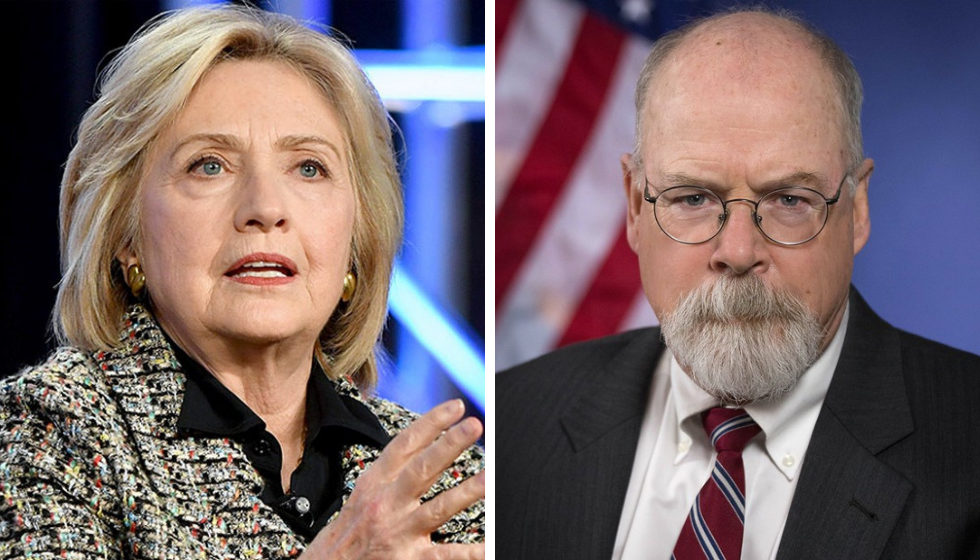OPINION: This article may contain commentary which reflects the author's opinion.
Special Counsel John Durham has responded to attorneys for 2016 Clinton campaign lawyer Michael Sussmann, who asked a court this week to dismiss the “factual background” portion of Durham’s Feb. 11 filing over alleged conflicts in the case.
Lawyers for Sussmann, who has been charged by Durham in his probe into the origins of the ‘Russiagate’ investigation with making a false statement to a federal investigator, are demanding the court “strike” the segment because they claim it will “taint the jury pool.”
The Sussmann motion comes on the heels of a bombshell filing late last week by Durham that honed in on potential conflicts of interest in relation to the former Clinton attorney’s representation after he has been charged with making a false statement to a federal investigator.
“Unfortunately, the Special Counsel has done more than simply file a document identifying potential conflicts of interest,” Sussmann’s attorneys wrote. “Rather, the Special Counsel has again made a filing in this case that unnecessarily includes prejudicial—and false—allegations that are irrelevant to his Motion and to the charged offense, and are plainly intended to politicize this case, inflame media coverage, and taint the jury pool.
“Sadly, the Special Counsel seems to be succeeding in his effort to instigate unfair and prejudicial media coverage of Mr. Sussmann’s case,” Sussmann’s attorneys added, according to Fox News.
The Clinton attorney’s legal team also called on the court to “strike the Factual Background portion of the Special Counsel’s motion pursuant to the Court’s inherent power to ‘fashion an appropriate sanction for conduct which abuses the judicial process.’”
In the February 11 filing in a section titled “Factual Background,” Durham said that Sussmann “had assembled and conveyed the allegations to the FBI on behalf of at least two specific clients, including a technology executive (Tech Executive 1) at a U.S.-based internet company (Internet Company 1) and the Clinton campaign.”
It also alleged that Sussmann’s “billing records reflect” that he “repeatedly billed the Clinton Campaign for his work on the Russian Bank-1 allegations.”
The filing showed that the Tech Executive and Sussmann met and talked to another law partner, who was serving as General Counsel to the Clinton campaign. That attorney, sources said, is Marc Elias, who worked at the law firm Perkins Coie.
In his response to the Sussmann legal team filing to strike not just the “factual background” but to dismiss the charge against their client, Durham said there is “no basis” for a court to grant the request, noting that the background is “central to proving” Sussmann’s “alleged criminal conduct.”
He also noted that some of that was essential to laying out the potential conflicts that were the central point of his Feb. 11 filing, per Fox News.
“As an initial matter, defense counsel has presumed the Government’s bad faith and asserts the Special Counsel’s Office intentionally sought to politicize this case, inflame media coverage, and taint the jury pool,” Durham’s filing said.
“That is simply not true,” he states, noting that his Feb. 11 filing “included two paragraphs of limited additional factual detail in its Motion for valid and straightforward reasons.”
“First, those paragraphs reflect conduct that is intertwined with, and part of, events that are central to proving the defendant’s alleged criminal conduct,” Durham wrote.
“Second, the Government included these paragraphs to apprise the Court of the factual basis for one of the potential conflicts described in the Government’s Motion, namely, that a member of the defense team was working for the Executive Office of the President of the United States (“EOP”) during relevant events that involved the EOP,” Durham wrote.
“If third parties or members of the media have overstated, understated, or otherwise misinterpreted facts contained in the Government’s Motion, that does not in any way undermine the valid reasons for the Government’s inclusion of this information,” he added.
“In light of the above, there is no basis to strike any portion of the Government’s Motion,” Durham wrote, noting further that the government will be filing motions in which it will “further discuss these and other pertinent facts to explain why they constitute relevant and admissible evidence at trial.”
